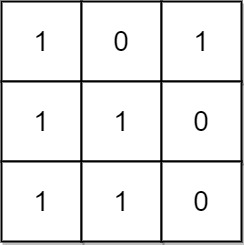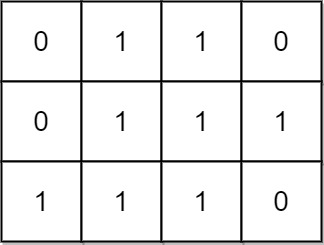LeetCode in Kotlin
1504. Count Submatrices With All Ones
Medium
Given an m x n binary matrix mat, return the number of submatrices that have all ones.
Example 1:

Input: mat = [[1,0,1],[1,1,0],[1,1,0]]
Output: 13
Explanation:
There are 6 rectangles of side 1x1.
There are 2 rectangles of side 1x2.
There are 3 rectangles of side 2x1.
There is 1 rectangle of side 2x2.
There is 1 rectangle of side 3x1.
Total number of rectangles = 6 + 2 + 3 + 1 + 1 = 13.
Example 2:

Input: mat = [[0,1,1,0],[0,1,1,1],[1,1,1,0]]
Output: 24
Explanation:
There are 8 rectangles of side 1x1.
There are 5 rectangles of side 1x2.
There are 2 rectangles of side 1x3.
There are 4 rectangles of side 2x1.
There are 2 rectangles of side 2x2.
There are 2 rectangles of side 3x1.
There is 1 rectangle of side 3x2.
Total number of rectangles = 8 + 5 + 2 + 4 + 2 + 2 + 1 = 24.
Constraints:
1 <= m, n <= 150mat[i][j]is either0or1.
Solution
class Solution {
fun numSubmat(mat: Array<IntArray>): Int {
val dp = Array(mat.size) { IntArray(mat[0].size) }
for (i in mat.indices) {
var c = 0
for (j in mat[0].indices.reversed()) {
if (mat[i][j] == 1) {
c++
} else {
c = 0
}
dp[i][j] = c
}
}
var ans = 0
for (i in mat.indices) {
for (j in mat[0].indices) {
var x = Int.MAX_VALUE
for (k in i until mat.size) {
x = Math.min(x, dp[k][j])
ans += x
}
}
}
return ans
}
}

